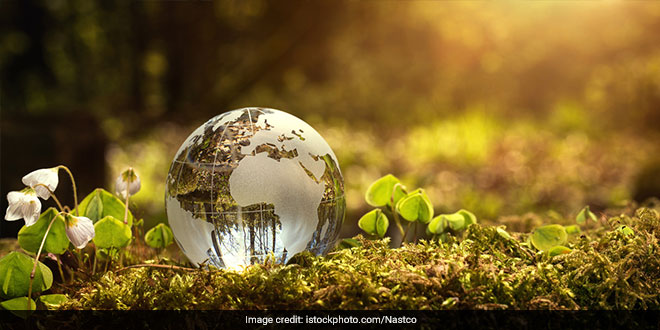New Delhi: Every year April 22 celebrated as the ‘Earth Day’, as it marks the birth of the modern environmental movement dating back to 1970. With the aim to make people aware about the issues plaguing the planet and ways to protect and preserve the ecosystem. The day is celebrated with activities around the world and global leaders come together to discuss the issues related to sustainable development, climate change and degradation of the environment. This year, the theme of Earth Day 2021 is ‘Restore Our Earth’ and it is being celebrated for three days from April 20 to 22. The aim is to initiate climate action where everyone has a role to play:
1. Clean-up Surroundings: It’s time to take small and localised actions that have an impact on environment. Undertake clean up drives or plogging (a new trend where picking up trash is combined with jogging) to not just improve the health quotient but also reverse the damage being done to the natural habitat.
2. Ditch The Meat And Opt For Plant-Based Diet To Reduce Carbon Footprint: The kind of food we eat also contributes to the carbon footprint, which is essentially defined as the amount of carbon dioxide released into the atmosphere as a result of the activities of a particular individual, organization, or community. Every stage of growing, rearing, farming, processing, transporting, storing, cooking and disposing of the food can add to greenhouse emissions. According to United Nations Climate Change Report, plant-based foods and sustainable animal-sourced food could free up several million square kilometres of land by 2050 and reduce global CO2 emissions by up to eight billion tonnes per year?
3. Change Habits: One can reduce the carbon footprint considerably by making small changes to the daily routine. For example:
a. Cut down pollution from vehicles by opting to walk or ride a bike for smaller distances and switching to vehicles using alternative fuels like electric vehicles in the long term.
b. Turn off lights when not in use. Replace incandescent light bulbs with more energy efficient options like compact flourescent (CFLs) or LEDs (Light-emitting diode).
c. Eat locally-produced, organic food as transporting food from a distance, whether by truck, ship, rail or plane, and cooling to keep foods fresh in transit, from spoiling, require fossil fuels.
d. Save water, take shorter showers and use a water-saving shower head
Also Read: Google Earth’s ‘Timelapse’ Reflects The Effects Of Climate Change Over The Past 37 Years
4. Save Paper: One of the other big ways to help save the environment is to go completely paperless. Opt for online billing and save trees.
5. Say No To Plastics: According to United Nations Environment Programme (UNEP), around the world, one million plastic drinking bottles are purchased every minute, while 5 trillion single-use plastic bags are used worldwide every year. Today, the world produces 300 million of plastic every year, as per United Nations Environment. That in simple terms is basically equivalent to the weight of entire human population. So ditch the single-use plastic completely such as polythene bags, straws, cups, bottles, to name a few, instead GO opt for reusable items.
6. Save Our Oceans: As per the Biological Diversity Organisation facts, around 100,000 marine animals are killed by plastic bags annually. World Economic Forum (WEF) said that there could be “more plastics than fish (by weight) in the ocean by 2050 if no action is taken immediately”.
7. Switch To Cleaner Energy At Home, Go Solar: To restore earth, we need to restore the healthy balance of carbondioxide (CO2). Solar panels are capable of generating power with zero emissions. Installing solar panels on your home helps combat greenhouse gas emissions and reduces our collective dependence on fossil fuel.
8. Adopt Composting: Instead of throwing the food waste in the dustbin opt for composting. Considered as one of the easiest waste management techniques, composting is the simplest forms of recycling that involves everyday kitchen waste. Experts say that just by segregating, recycling and composting, a family of four can reduce their waste from 1000 Kg to less than 100 kg in a year’s time.
9. Say Yes To Meal Preps: Another way to reduce your carbon footprint is meal prep (a concept of preparing whole meals or dishes ahead of schedule). It is one of the biggest ways in which you can help the environment. Moreover, instead of throwing the excess food in the dustbin, freeze and reuse the leftovers.
10. Adopt 3 R’s: Lastly, adopt the three R’s – Reduce, Recycle & Reuse to cut down on the amount of waste generated and conserving natural resources, landfill space and energy.
Also Read: Vehicle Scrappage Policy: Is India On The Right Track To Ensure Clean Air For All?
NDTV – Dettol Banega Swasth India campaign is an extension of the five-year-old Banega Swachh India initiative helmed by Campaign Ambassador Amitabh Bachchan. It aims to spread awareness about critical health issues facing the country. In wake of the current COVID-19 pandemic, the need for WASH (Water, Sanitation and Hygiene) is reaffirmed as handwashing is one of the ways to prevent Coronavirus infection and other diseases. The campaign highlights the importance of nutrition and healthcare for women and children to prevent maternal and child mortality, fight malnutrition, stunting, wasting, anaemia and disease prevention through vaccines. Importance of programmes like Public Distribution System (PDS), Mid-day Meal Scheme, POSHAN Abhiyan and the role of Aganwadis and ASHA workers are also covered. Only a Swachh or clean India where toilets are used and open defecation free (ODF) status achieved as part of the Swachh Bharat Abhiyan launched by Prime Minister Narendra Modi in 2014, can eradicate diseases like diahorrea and become a Swasth or healthy India. The campaign will continue to cover issues like air pollution, waste management, plastic ban, manual scavenging and sanitation workers and menstrual hygiene.
[corona_data_new]





























